Review| The Post
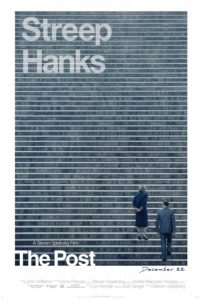 Since the beginning of the American republic, there has been a free press – people whose job it is to bring stories of note to the public, including stories about government, both good and bad. The Founding Fathers intended the press to be a check on the power of the state, and hold lawmakers accountable for their actions.
Since the beginning of the American republic, there has been a free press – people whose job it is to bring stories of note to the public, including stories about government, both good and bad. The Founding Fathers intended the press to be a check on the power of the state, and hold lawmakers accountable for their actions.
In the years since our founding, the press has unfortunately devolved into shameless advocacy. Today’s “journalists” can’t hold a candle to the newsmen of a half-century ago. But that’s a discussion for another day.
Steven Spielberg’s The Post reminds us of a time when journalists still covered the news and there was still a semblance of integrity in their ranks…more or less. The film is based on the historic fight between The Washington Post and The White House on the publication of the classified Pentagon Papers in 1971. It was a watershed moment in American journalism, and Spielberg puts his spin on it – which is enjoyable aside from the blatant modern politics infused within.
The Post brought up one of the fundamental desires of human beings: the quest for truth. None of us like to be lied to, especially by our purported employees in government. And we all have this innate desire to learn the truth – a desire that was implanted within us by our Creator.
The Good: Classic Spielberg
With The Post, Steven Spielberg proves he’s one of the modern masters of film by delivering another well-made historical drama, a genre in which he excels. When the film works, it really works, with all creative cylinders firing. Spielberg creates all the right emotions when they are needed and the film logically flows almost effortlessly. The tension in some of the scenes, particularly when it came time for the Post staff to decide to publish, felt real.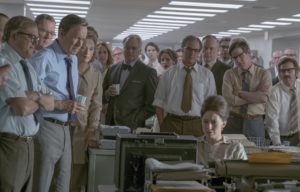
This film had a great ensemble cast, and they all seemed to disappear into their roles. The two leads, Tom Hanks and Meryl Streep were terrific together – probably the best performance of Streep’s I’ve seen in a while. Her character, Washington Post publisher Kay Graham, has an actual emotional arc – from meek and unsure newbie to resolute and confident leader.
One cannot have a Spielberg movie without a John Williams score (well, one can, but it’s not as good). The Post contains one of Williams’ most unique soundtracks and suits the visuals perfectly. The music soars when necessary and invokes feelings of dread that aid in the suspense of the best tense scenes. He even inserted a little 70s electronic vibe, which was great. Just an amazing score all around.
The Bad: An Anti-Climactic Climax and Blatant Politics
Anytime Steven Spielberg gets overtly political in his films, he takes his directorial eye off the storytelling ball, making mistakes that someone of his caliber shouldn’t. Munich is the best example of this – one of the few Spielberg films I’ve seen that is just unwatchable because of the on-the-nose politics. The Post suffers from Spielberg’s need to make political points that aren’t there or subtlety.
The most garish political posturing is in some of his shots, which made my list of “come on” moments in this movie. The most on-the-nose, eye-rolling example was the shot of Kay Graham walking down the steps of the Supreme Court. She was flanked on either side by fawning women who looked like they wanted to touch her clothes and be healed.
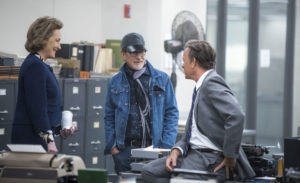 The Post‘s story structure is noticeably imbalanced. Spielberg and his writers built up so much tension with Kay’s decision to publish the Papers that it ended up being a premature climax in the second act. When the actual climax of the film came in the third act (the Supreme Court ruling), it was treated tonally and emotionally as a sort of an afterthought.
The Post‘s story structure is noticeably imbalanced. Spielberg and his writers built up so much tension with Kay’s decision to publish the Papers that it ended up being a premature climax in the second act. When the actual climax of the film came in the third act (the Supreme Court ruling), it was treated tonally and emotionally as a sort of an afterthought.
The third act climax was just the Post staff in the newsroom listening to another person get the news from the court with little tension and suspense – as if the characters already knew the court’s decision was a foregone conclusion. It was a letdown – the editing, pacing, staging, everything was just kind of blah in what was supposed to be the penultimate scene of the movie. Its only saving grace was John Williams’ score, which let the audience know that this scene was important.
Unfortunately, Spielberg has fallen into the trap of the unnecessary shaky-cam fad. The first few minutes of this The Post were almost unbearable to watch because of the violent use of shaky-cam. Both my wife and I had to look away a couple times to keep from getting dizzy.
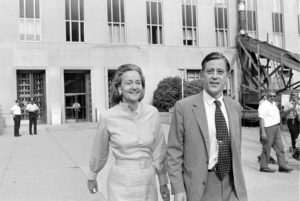 I love history so I would prefer that historical dramas get at least most of the story right. While The Post did indeed accomplish this on a technical level, it grossly overplayed The Washington Posts‘ role in publishing The Pentagon Papers.
I love history so I would prefer that historical dramas get at least most of the story right. While The Post did indeed accomplish this on a technical level, it grossly overplayed The Washington Posts‘ role in publishing The Pentagon Papers.
James C. Goodale, a lawyer who was actually involved in the release of the classified documents, recently wrote an op-ed piece claiming that the film gives The Washington Post far too much credit and that the better story lies with The New York Times‘ months-long analysis of the documents and their legal battle. I suspect that this was done in order to make a political point since Kay Graham was the female underdog publisher and there is a current cultural movement emphasizing women. Based on Goodale’s piece, The Times would have been the better, more accurate, movie.
“What is Truth?”
“…Jesus answered, ‘You say that I am a king. In fact, the reason I was born and came into the world is to testify to the truth. Everyone on the side of truth listens to Me.’
‘What is truth?’ retorted Pilate…” John 18:37-38
Andrew Klavan, a novelist and political commentator whom I respect greatly, posed an interesting idea regarding the importance of the verbal confrontation between Jesus and Pontius Pilate. “Whether it’s Nietzsche standing in for Pilate or it’s Woody Allen, whether it’s Dostoevsky batting for Christ or it’s Tolkien,” Klavan wrote. “The question is the same. Is there an ultimate moral reality that guides human life or is it as Hamlet said, and ‘there is nothing either good or bad but thinking makes it so?'”
There’s a good reason why Jesus called Himself “the Truth.” He came to provide an answer to mankind’s seemingly unending journey to the truth. But just as Pilate posed to Christ Himself and morally relativistic question, people still choose to deflect the Truth and go their own way. And that Christ/Pilate dynamic, according to Klavan, has become the foremost philosophical question of our age.
The press’ creed of truth-seeking, as emphasized in The Post, is a reflection of an innate desire everyone has for truth. We don’t like being lied to. The Pentagon Papers illustrated the ability of men and governments to lie, and the necessity of a free press to expose those lies and keep leaders and governments in check (though I must say that I don’t agree with the way in which The Pentagon Papers were obtained).
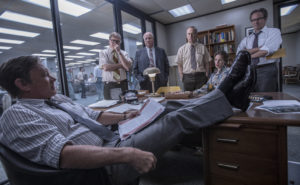 One of the reasons why the truth is so elusive is because the truth, the actual Truth, is not something that everyone can handle. It is revealing, inconvenient, brings up wounds, and causes us to look at ourselves for who we really are. In The Post, Kay and former Secretary of Defense Robert McNamara enjoyed a friendly relationship, until the truth of The Pentagon Papers drove a wedge between them.
One of the reasons why the truth is so elusive is because the truth, the actual Truth, is not something that everyone can handle. It is revealing, inconvenient, brings up wounds, and causes us to look at ourselves for who we really are. In The Post, Kay and former Secretary of Defense Robert McNamara enjoyed a friendly relationship, until the truth of The Pentagon Papers drove a wedge between them.
“Then you will know the truth, and the truth will set you free.” John 8:32
The truth may be harsh and uncompromising, but it’s also forgiving and merciful. The Truth, through Jesus, offers healing and grace. In our blind grasping for a semblance of truth in this world, Jesus offers a respite – a rock to build a foundation in a world of sand. It is true that our lives are racked with sin, but we don’t have to be shackled by it. Through the truth, the Truth, God has set us free to be with Him.
So What I’m Trying to Say is
The Post is a solid piece of filmmaking, but just an okay movie overall. However, good Spielberg is better than a lot of the movies out there. Even though it has a blatant political agenda that hindered its ability to tell the whole story, the film was still an enjoyable, riveting piece of cinema.
As creations of a good and just God, we all have within us a desire to seek the truth. It is the job of the press to find truth in our world events, but don’t depend on them to give it to you the truth about life itself. They are human and have biases just like we all do. Seek the truth, instead, through Christ because He is the Truth.



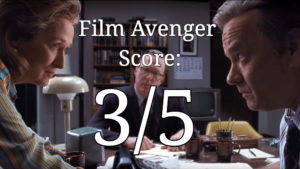


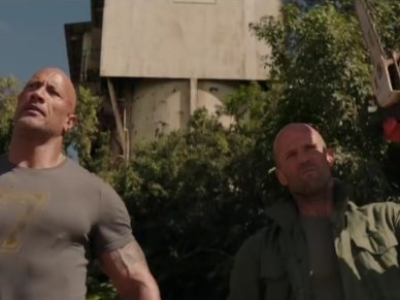


Pingback: #166 – The Post and Discerning Truth | Reel World Theology